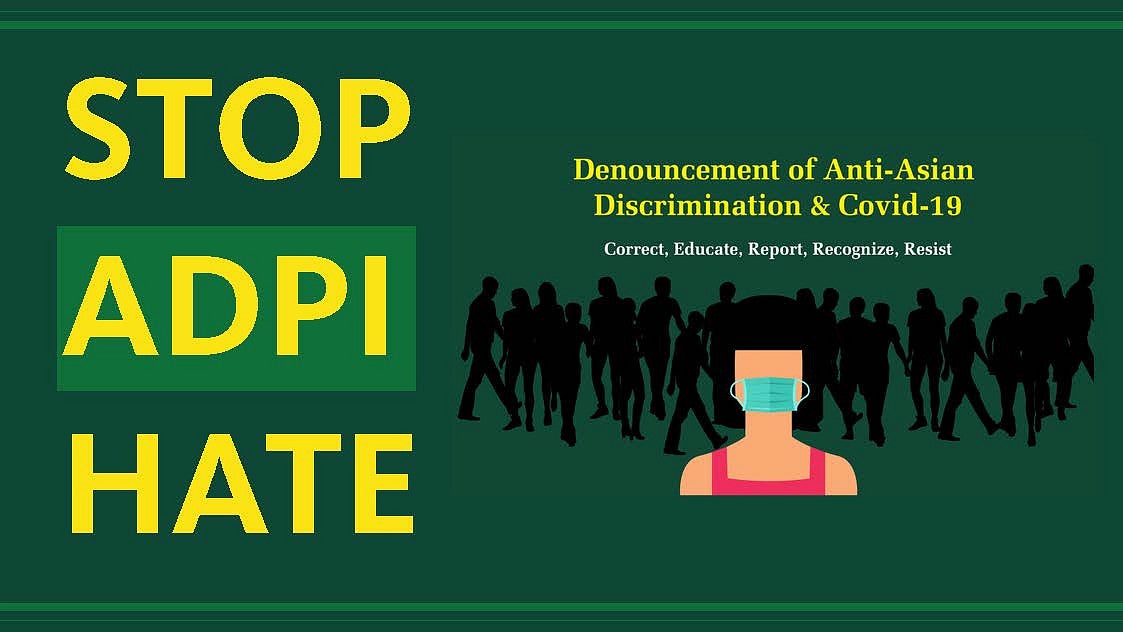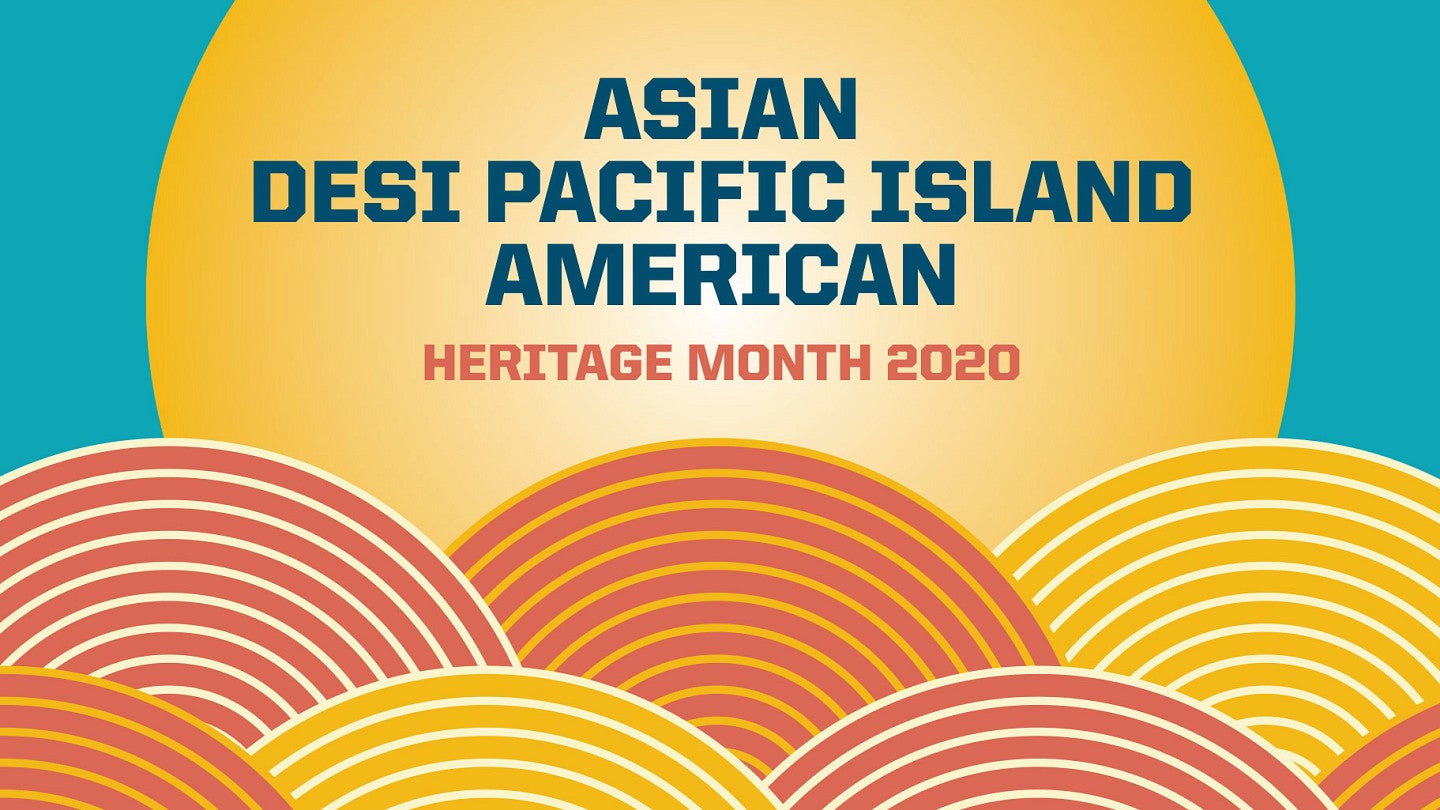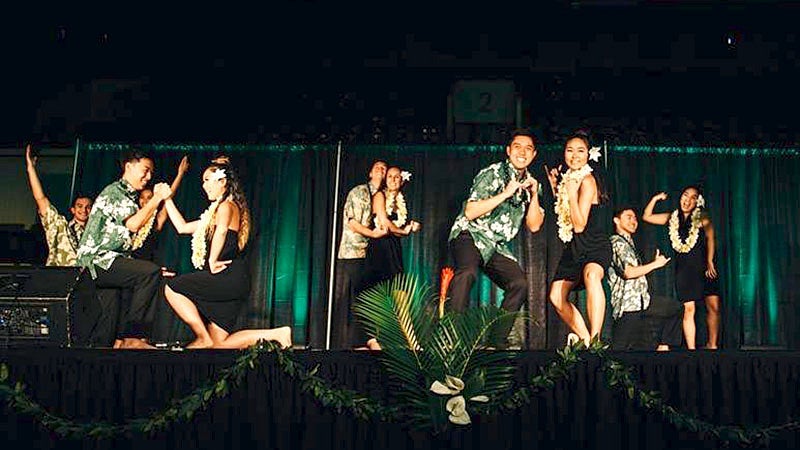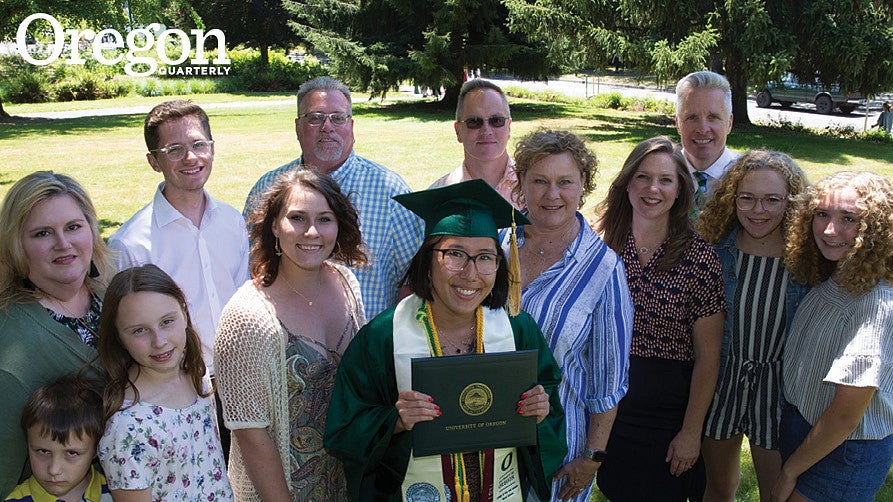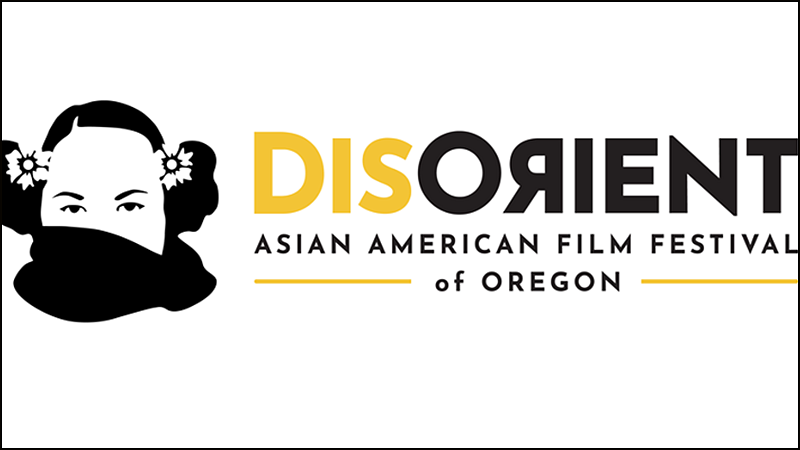The Asian Desi Pacific Island American Heritage Month celebration not only recognizes the historical and contemporary importance of the contribution of the Asian Desi Pacific Islander (ADPI) community, but also serves as a means of promoting the diverse culture, indigenous knowledge, and community-building initiatives that take place during May and throughout the year. The celebration in the US began as a week-long commemoration in 1978 under the Carter administration and was extended to a month in 1990.

The ADPI connection in Eugene goes beyond just May and has a long history, including the Eugene Kathmandu Sister City Association established in 1975 and the community coming together in May 2015 after the devastating earthquake in Nepal. The Oregon Asian Celebration will be celebrating its 36th year with an outdoor market with dozens of represented cultures, including Chinese, Indian, Japanese, Middle Eastern, Korean, Thai, Vietnamese, Filipino, Central Asian, and many more. Below you will see two interviews with those involved with the DisOrient Film festival, which began in 2006. We hope when we return in person that we will again have a UO Asian and Pacific American Heritage Month Awards Night, which began in 2015, as well as many of the other campus activities. I’ve seen the vibrant community thriving since I have been fortunate to be in Eugene since 2013, and in my position as the multicultural academic counselor, Asian, Desi, and Pacific Islander retention specialist, which I have held since June 2020.
With the multitude of diversity within the ADPI community, the common thread has been the importance of family and community. You will see that thread in many of the words of ADPI members included below. The need to move past the patriarchal individualistic nature of the capitalistic society toward a feminist ethic of a care community model has been made clearer since the beginning of the pandemic last year. When the time to come together to work on opposing systemic structural issues has never been more important, the concerning increase of violence, assault, and silencing of the ADPI community should not be tolerated, as reaffirmed from the statements from the ADPI Strategies group, the president, provost, vice president for equity and inclusion, and others. Whether it is fighting against racial injustice, or supporting the most vulnerable population during the pandemic, we must use this year’s celebration as a means to have difficult conversations and realize ways to ensure the safety and thriving of ADPI culture and all the people it represents.
— Sugam Singh
Multicultural Academic Counselor,
Asian, Desi and Pacific Islander Retention Specialist

- UO ADPI Strategies Interest Group
- Denouncement of Anti-Asian Discrimination & COVID-19
- President, provost condemn violence against Asian Americans
- Loving Our Asian, Desi, and Pacific Islander American Brothers and Sisters As We Love Ourselves by Yvette Alex-Assensoh, Vice President for Equity and Inclusion
- Atlanta killings reverberate in PNW Asian community interview with Gordon Hall, Professor Emeritus, Department of Psychology
- ADPI Heritage Month Has a New Sense of Urgency in 2021
ADPI Student Voices
Three ADPI students addressed issues of identity, ADPI Heritage month, community at the UO, and more.
Life at the UO
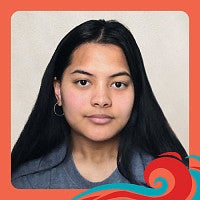
As a first-generation, Pacific-Islander student, I definitely feel very advocated for by the UO staff, especially during these trying times. I’m a Pathway Oregon Scholar, and I also joined the Multicultural ARC. From those programs, I am provided advisors who I meet with at least once or twice a month online through Zoom. Each time, they show a genuine desire for my success and are very encouraging and guiding of the path I take as a UO student. Along with that, I’m also a part of USO, a club for ADPI students led by ADPI staff, where we join together once a week through Zoom, talk story, have fun, and bring comfort to each other in our relations as ADPI students and staff through our academic journey. Within each of these meetings, I’m provided a safe, open space to vent about our common experiences, whether that be the challenges faced as Pacific-Islander students, or the financial/home/academic struggles faced during this pandemic.
– Asia Petrus
Family and Human Services
Class of 2024

I moved to the US when I was 12 years old to get a better education. I had a hard time adjusting to the new language and new culture for a while before I could feel confident around other people. Now that I’m at UO, I have made many connections with other students and professors who support me. I was also quite surprised that I received the PathwayOregon and DES scholarships. With these awards, I am able to attend college and pursue my passion to become an artist.
I have been going to the ADPI Cultural Study Hall (USO) and the Thai Student Association (TSA) virtual meetings. The Study Hall is a way for me to get academic support and to share stories about my own cultural experiences. As for the TSA, it is amazing to be able to talk to other people in my own language and share a common experience.
– Anna Hothai
Art and technology
Class of 2023
ADPI Heritage Month
ADPI Heritage Month always brings out a sense of pride I have for who I am and where I came from. I plan to share with others the meaning of this month as well as my pride in being Pacific-Islander.
I’m a first-year student doing my schooling from home due to the pandemic so I’ve yet to experience ADPI Heritage Month on campus. I do wish that I could have experienced the sharing of our common pride in our ADPI heritage, I know it would have been really fun, especially knowing just how much fun I’m having through these online meetings I have with ADPI advisors and other ADPI students.
– Asia Petrus
Half of my college experience has been online because of COVID-19. That said, I didn’t get to experience as much campus life as I wanted to. For the ADPI heritage month, what I miss the most is going to the APASU meeting in the Multicultural Center. My first time going to the meeting was a little intimidating. The MCC room was big, and there were a lot of new faces. However, I was made to feel welcomed right away. Something I hope to do in the future is to meet more people and share some good food! My family has a Thai food business, and I’ve always loved to cook. It’d be awesome to be able to share food and try new dishes from different cultures.
– Anna Hothai

ADPI Heritage Month is very special this year considering all that’s happening in our country right now. This year it is more important than ever to celebrate the ADPI community and all the hardships we have faced. I plan on celebrating ADPI Heritage Month by attending many of the cultural events that ADPI identified clubs are putting on.
This year I really miss being able to connect as a community in person. Meeting and connecting with people who have similar backgrounds is one of the most exhilarating things at the UO. I also miss being able to attend cultural nights that displayed dances, food, and each club’s culture.
– Jaya Das
Data Science and Mathematics
Class of 2022
Advice for incoming students
Coming to the UO it might be overwhelming and a culture shock for most; it was for me, but definitely know that there is a strong community here that is very welcoming and fun!
– Jaya Das
UO has been very supportive in my path to being successful as an ADPI student. They will advocate for you and guide you even when you have no idea what you’re doing. Also, make sure to join clubs that will unite you with your community! It’s a really fun way of joining with others who share similar struggles, and you make many meaningful connections with others.
– Asia Petrus
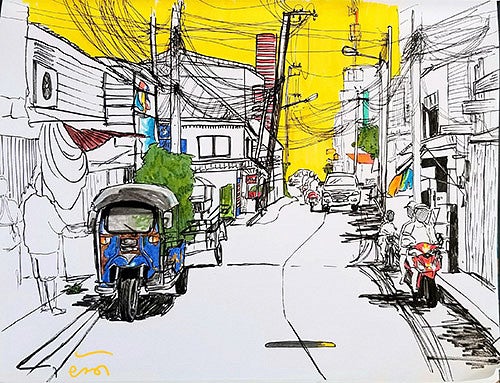
Anna Hothai's artist statement: I make art about my Thai cultural identity. After I moved from Thailand to the US, I got a sense that I am caught between two cultures. While I call Thailand my home, I feel like I don’t know my own country as well as I should. And because I didn’t grow up in the US, I can’t relate to many of the people my age. I explore this cultural struggle through my art practice such as in this piece, “Prasae” (2020), which deals with the fragmentation of memories about my hometown.

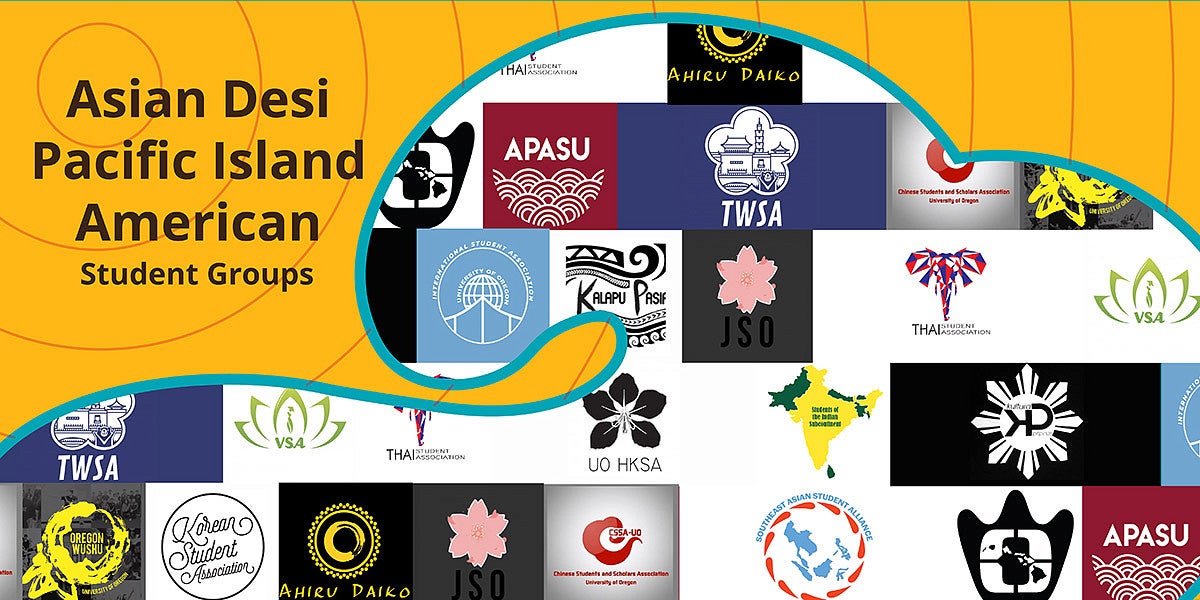
The mission of the Asian, Desi, Pacific Islander Strategies Group (ADPI SG) is to provide a supportive space for University of Oregon and community members to discuss and act upon issues related to the diaspora of the Asian, Desi, and Pacific Islander communities on campus.

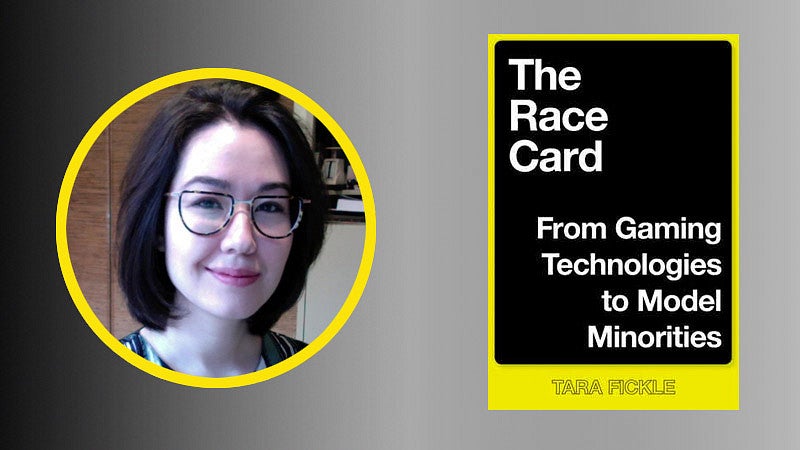
Tara Fickle and The Race Card: From Gaming Technologies to Model Minorities
English professor Tara Fickle, will join two guest panelists to discuss their work on race and gaming. She has been researching the intersection of esports, gaming and race and recently offered her thoughts on what she has uncovered.
DisOrient Film Festival
Jason Mak
Major: ’00 Ethnic Studies
Executive Director, DisOrient Film Festival; Diversity and Inclusion Manager for State of Oregon
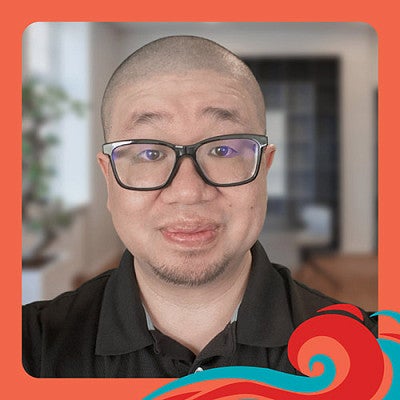
For Jason Mak, BA ’00 (ethnic studies, general science), the ADPI community can’t be summed up in a single experience or with a couple of adjectives. It unites a wide variety of individuals with diverse identities and lived experiences.
As a UO undergraduate, Mak found himself involved in the Asian Pacific American Student Union (APASU) as their historian before becoming Codirector. He connected with other members of student organizations and bridged cultural connections as a student leader.
After graduating, Mak pursued a master’s degree in Asian American Studies at UCLA. During his graduate work he began to explore concepts of identity.
“In every geographical space, identity always shifts and depends on the people and the causes of what you’re associating with,” he said. “One of my big interests in grad school at that time is how Asian American identity was really this colonizer narrative that centered Asians and their desire to be a part of that white power structure.”
While in graduate school, he learned about community documentary filmmaking and found a creative outlet in film. He created a documentary about Louie’s Village, a restaurant his family owned in Eugene that was located across the street from the university. The filmed explored aspects of his own identity and upbringing in Eugene.
“Grad school really opened my eyes to a lot of things,” he said. “One of those things was the power of film. It can change lives and make people feel like they’re real, they’re whole.”
After moving back to Eugene, Mak tapped into his network of connections in the Asian American film community and began developing ideas for a new project. What resulted from those conversations was DisOrient, an independent film festival for Asian American creators in Oregon.
The name “DisOrient” isn’t just a play on words. It reflects Mak’s vision for the festival “as a reclamation of our own identity and our own image.”
“Filmmakers and audiences are [usually] very separated,” says Mak, “so we wanted to try to erase some of that feeling and really create a sense of a community that comes together around art.”
Now in its fifth year, the DisOrient Film Festival transcends cultural boundaries as an innovative showcase at the University of Oregon. The week-long event serves as a platform for Asian American filmmakers to share their stories in a supportive and inclusive environment.
Today Mak works as the diversity and inclusion manager for the Oregon Department of Human Services, but his passion for filmmaking and for the festival is still as strong as ever.
“It really fills my heart that so many different people have felt so personally touched by the stories that are told, that they can find a piece within the festival that speaks to them and their experience.”
Brittany Hua
Major: Business Administration and Cinema Studies, Class of 2021
DisOrient Film Festival staff
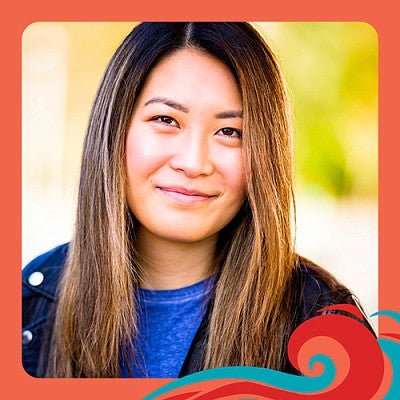
Brittany Hua knew from an early age that she wanted to work in entertainment. Growing up she sang, acted, and danced. Her passion for the performing arts drew her to potential career paths in this field.
A fourth-year business administration and cinema studies double major, Hua began volunteering with the DisOrient Film Festival at the start of her junior year. This spring, she served as a story associate producer and helped organize the festival in its first virtual iteration.
“I never really knew that there were outlets for Asian American filmmakers,” says Hua. “I think the best part of that experience was the opportunity I got to sit and watch the movies with everyone when I wasn’t working.”
As a Portland native, Hua felt disconnected from the ADPI community outside of her circle of family and friends. Her first two years at the University of Oregon helped expand that network and strengthened her connections to other students who had similar lived experiences.
“I’ve always had a bit of an identity crisis because I feel like I don't know any other home,” she said. “And for the most part, like my parents, don't necessarily know any other home than the United States either.”
These reflections are shaped by a more nuanced understanding of the Asian American community and its diverse nature. Deconstructing the idea of this group as a political and ethnic monolith highlights the unique histories and cultural experiences its members share.
Hua’s passion for film and media led her to leadership positions in the Asian Pacific American Student Assocation and the Vietnamese Student Association. To her, these organizations serve as safe spaces for students of color on campus.
Diversity and inclusion should remain at the forefront of our agenda at the University of Oregon, she says. “I don't see much representation of people of color in general, let alone ADPI representation among professors and students.”
For Hua, improving Asian American media representation is what motivates her to pursue a career in the entertainment industry.
“I’m tired of the stories being told from the lens of a white person,” says Hua. “I want these things to be documented from the eyes of like Asian Americans.”
Her involvement in the DisOrient Film Festival and experience she gained through the cinema studies program helped her land professional roles on productions like “Top Chef.”
Hua is excited for what life has in store for her after she graduates this spring. With degree in hand, her next big role will be as an associate producer for critically acclaimed Netflix television series “Bling Empire.”
“I have always tried to make it a goal of mine to somehow be a leader, especially in terms of the creative industry,” she says. “I want to be the person a younger generation can look up to, or someone they could name as the person in the film industry who made it possible.”
UO ADPI Alum

Daniel Wu, BArch ’97, is an actor, director, and producer spanning more than 20 years and two continents. With more than a quarter of a million Twitter followers and nine million followers on the Chinese social media app Weibo, Wu is one of Asia’s most recognizable actors. He has performed in more than 40 films as well as in the AMC television series, Into the Badlands. In mainland China, Hong Kong, and Taiwan, he has earned film awards for his acting and directing. Wu currently lives in Oakland, California with his wife Lisa and daughter Raven. Listen to an interview with Wu on the Duck Stops Here Brodadcast: Action Hero, Activist and Asian Megastar: Daniel Wu.
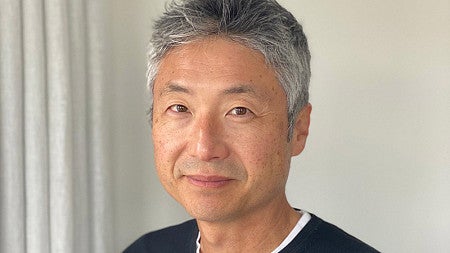
A Quantum of Sweetness: Korean American Hemingway Award-winning author and Pulitzer finalist Chang-Rae Lee, MFA ’93 (creative writing) reflects on many of the coming-of-age themes that he experienced during his time in Eugene. His new novel, My Year Abroad, focuses on the influence and importance of human connection.
Works spanning four millennia of Chinese history can be experienced from your living room thanks to new high resolution, 360-degree virtual tours at the Jordan Schnitzer Museum of Art. Myriad Treasures: Celebrating the Reinstallation of the Soreng Gallery of Chinese Art include examples of the museum’s superlative Qing-dynasty (1644-1912) court textiles, Neolithic (2650-2350 BCE) through 19th-century ceramics, ancient and archaistic bronze vessels, Buddhist art, literati and professional paintings and prints of the fourteenth through nineteenth centuries, imperial calligraphy, elegant decorative objects made of jade, glass, and crystal, and selected modern and contemporary Chinese paintings, posters, and photographs. This installation celebrates the last century of cross-cultural engagement at the University of Oregon and heralds exciting future faculty and student research on the museum’s enduring and expanding collection of Chinese art.
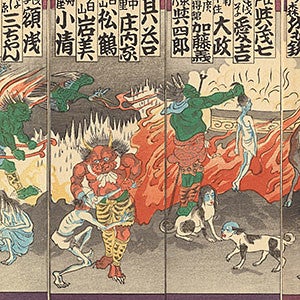
UO Libraries
Asian American and Pacific Islander Heritage Month – May 2021
Recognizing and celebrating AAPI Heritage
Asian Americans and Pacific Islanders have a rich heritage that has shaped the history of the United States and are an integral part of the University of Oregon community.
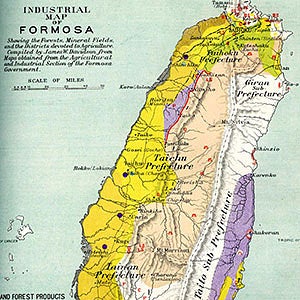
During the month of May, and throughout the year, the University of Oregon Libraries will highlight examples of resources and collections that focus on AAPI histories and cultures.
For more information on UO Library research guides, digital collections, blogs and more see the UO Library Asian and Pacific Islander Heritage Month page.
UO LIbrary ADPI Resources



